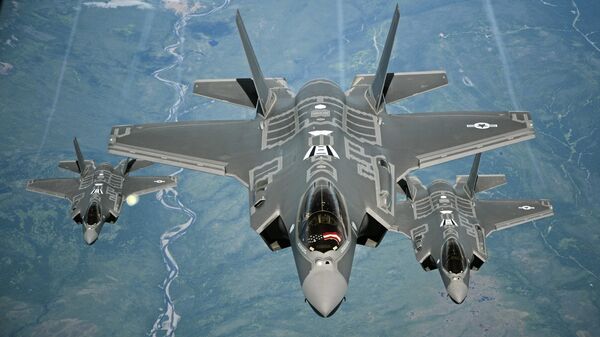Israel lobbied the United States to exclude Turkey from the F-35 stealth fighter jet programme as part of its efforts to preserve a qualitative military edge in the region, The Times of Israel reported, citing Channel 12.
Since Turkish President Recep Tayyip Erdogan refused to abandon a deal to purchase Russian-made S-400 missile defence systems, Israel, which is the second country after the US to receive the F-35 from Lockheed Martin, reportedly tried to block Washington from selling the jets to Ankara over alleged concerns that it would give Turkey advanced air capabilities.
Neither Israeli, nor American officials have commented on the report so far.
In mid-July, the US announced a decision to remove Turkey from its F-35 programme after Ankara received the first batch of Russia's S-400s, saying that the fighter jets "cannot coexist with a Russian intelligence collection platform that will be used to learn about its advanced capabilities".
"Unfortunately, Turkey's decision to purchase Russian S-400 air defence systems renders its continued involvement with the F-35 impossible", the White House said in a press release on 17 July.
The unilateral move was blasted by the Turkish Foreign Ministry as having "no legitimate foundations":
"It is unfair that Turkey, which is one of the [United States'] main partners on the F-35 programme, is excluded from it. We are calling on the United States to abandon this mistake which cause irreparable damage to our strategic relations".
Turkey received the first batch of S-400s last month in a move that caused US President Donald Trump to consider imposing sanctions on the NATO ally.
The US has on a multitude of occasions voiced concerns the S-400s are incompatible with NATO military equipment and claimed that the Russian systems pose a threat to the F-35s, for the simultaneous procurement would ostensibly give Russian experts key insights into sensitive data related to the jet's technology.
Washington has likewise threatened to impose sanctions on Ankara under the Countering America's Adversaries Through Sanctions Act (CAATSA). The Turkish side has, for its part, insisted that the acquisition of those weapons is its sovereign affair and has dismissed the possibility of abandoning plans to complete the deal.

